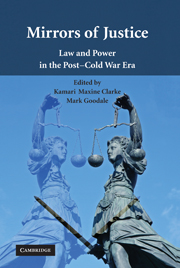Book contents
- Frontmatter
- Contents
- Editor Biographies
- Contributors
- Acknowledgments
- Introduction: Understanding the Multiplicity of Justice
- 1 Beyond Compliance: Toward an Anthropological Understanding of International Justice
- PART I JUSTICE AND THE GEOGRAPHIES OF INTERNATIONAL LAW
- PART II JUSTICE, POWER, AND NARRATIVES OF EVERYDAY LIFE
- PART III JUSTICE, MEMORY, AND THE POLITICS OF HISTORY
- 11 Impunity and Paranoia: Writing Histories of Indonesian Violence
- 12 National Security, Weapons of Mass Destruction, and the Selective Pursuit of Justice at the Tokyo War Crimes Trial, 1946–1948
- 13 Justice and the League of Nations Minority Regime
- 14 Commissioning Truth, Constructing Silences: The Peruvian Truth Commission and the Other Truths of “Terrorists”
- Epilogue: The Words We Use: Justice, Human Rights, and the Sense of Injustice
- Index
- References
13 - Justice and the League of Nations Minority Regime
Published online by Cambridge University Press: 25 January 2010
- Frontmatter
- Contents
- Editor Biographies
- Contributors
- Acknowledgments
- Introduction: Understanding the Multiplicity of Justice
- 1 Beyond Compliance: Toward an Anthropological Understanding of International Justice
- PART I JUSTICE AND THE GEOGRAPHIES OF INTERNATIONAL LAW
- PART II JUSTICE, POWER, AND NARRATIVES OF EVERYDAY LIFE
- PART III JUSTICE, MEMORY, AND THE POLITICS OF HISTORY
- 11 Impunity and Paranoia: Writing Histories of Indonesian Violence
- 12 National Security, Weapons of Mass Destruction, and the Selective Pursuit of Justice at the Tokyo War Crimes Trial, 1946–1948
- 13 Justice and the League of Nations Minority Regime
- 14 Commissioning Truth, Constructing Silences: The Peruvian Truth Commission and the Other Truths of “Terrorists”
- Epilogue: The Words We Use: Justice, Human Rights, and the Sense of Injustice
- Index
- References
Summary
JUSTICE AND DIFFERENCE
In the final third of the twentieth century, a host of social movements challenged the ostensible neutrality of liberal conceptions of equality enshrined in the modern, liberal state, demanding a recognition and valorization of difference. These movements – feminism, gay and lesbian activism, ethnic identity movements, disability rights movements, to name but a few – challenged hegemonic conceptions of justice as difference-blind. They provoked a tidal wave of theoretical work in the areas of multiculturalism and the politics of difference, all of which tried to grapple with the implications that recognizing differences within the citizenry might have for justice. One could be forgiven for thinking that states had never before faced the challenges of difference or attempted to address difference politically and legally.
In fact, in the period immediately following the First World War, fifteen states, most of them located on the eastern periphery of Europe, legally committed themselves to doing precisely this. Along with the postwar peace treaties, they signed what became known as “minorities treaties.” These treaties required treaty-bound states – caustically dubbed “minority states” by international relations scholar Inis Claude (1955) – explicitly to grant equal civil and political rights to members of “racial, religious and linguistic minorities,” but also certain special rights that arose from their differences, such as free use of their maternal language, the right to set up charitable institutions at their own expense, and the right to primary education in the maternal language if the minority made up a “considerable proportion” of a district's residents.
- Type
- Chapter
- Information
- Mirrors of JusticeLaw and Power in the Post-Cold War Era, pp. 270 - 290Publisher: Cambridge University PressPrint publication year: 2009



